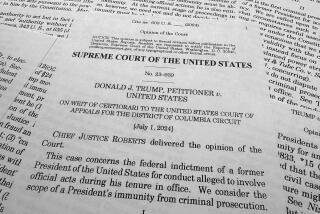High Court Says Seniority Trumps Disability in Job Placement
WASHINGTON — Disabled employees who say they need a less-demanding job generally do not have a right to bump workers with more seniority, the Supreme Court ruled Monday.
The 5-4 ruling resolves a conflict created by the Americans with Disabilities Act, the 1990 law that said workers with a physical or mental impairment have a right to work so long as they can do so with a “reasonable accommodation” by their employers.
At the same time, the law said this accommodation must not put an “undue burden” on the employer.
Employers say they should not have to bump more-senior workers in favor of a disabled employee, and the Supreme Court largely agreed.
“In our view, the seniority system will prevail in the run of cases,” wrote Justice Stephen G. Breyer for the court. “Ordinarily, the ADA does not require . . . an employer to assign a disabled employee to a particular position even though another employee is entitled to that position under the employer’s established seniority system.”
But there are exceptions to this general rule, Breyer added. If, for example, seniority is not generally followed in assigning jobs, an employer cannot rely on the seniority system as a reason for refusing to place a disabled employee there, the court said.
Monday’s ruling is the third in the last few years to limit the reach of the ADA.
Two years ago, the court ruled that employees with treatable diseases or medical conditions, such as diabetes or extremely high blood pressure, are not disabled, even if they are fired because of these impairments.
In January, the court said the hundreds of thousands of workers with carpal tunnel syndrome and other repetitive-stress injuries generally are also not disabled, as long as they can carry on the ordinary tasks of daily life.
Monday’s ruling concerned the case of an airport cargo handler, Robert Barnett, who was deemed disabled in 1992 because of a back injury. Shortly after the ADA was passed, most lawyers and disability rights experts assumed that its broad anti-bias provisions covered any worker with a serious physical or mental impairment.
Based on that understanding, Barnett sued US Airways because it refused to reassign him to the mail room. He had hurt his back while working at San Francisco International Airport, and his doctor said he would have to avoid heavy lifting.
When Barnett sought the job in the mail room, his supervisor said two other workers with greater seniority had also sought transfers to the mail room, and that they had first bids on those jobs. As an alternative, Barnett asked that he be given special lifting equipment in the cargo area.
US Airways refused both suggestions. Barnett was placed on injured status and eventually lost his job.
In 1993, Barnett sued the airline for discrimination, claiming that it had failed to make a “reasonable accommodation” for his disability as required by law.
A federal judge ruled for the airline and said it need not waive its seniority system in favor of a disabled employee. To do so would put an “undue hardship” on the employer, the judge said.
Barnett appealed; the U.S. 9th Circuit Court of Appeals revived his case and said it should go to a jury. His request to be reassigned to the mail room was reasonable, the appeals court said.
Companies are loath to fight job discrimination cases before juries, and US Airways appealed to the Supreme Court. Its lawyers argued that seniority systems govern job assignments generally and that equal treatment for disabled employees does not entitle them to preferential treatment.
In the end, the Supreme Court split virtually down the middle on the issue.
The five justices in the majority sided with US Airways in saying that seniority usually rules, but they left open a chance for employees to show that the employer does not always follow a system of seniority transfers.
The dissenters split into two camps.
Justices David H. Souter and Ruth Bader Ginsburg took a more liberal stand, saying the law gives disabled employees a right to a “reasonable accommodation.”
Justices Antonin Scalia and Clarence Thomas, taking the conservative side, said disabled employees are not entitled to preferences over senior workers.
Scalia also faulted Breyer for setting out a muddled, middle-ground position. The court has made the law into “a standardless grab bag” from which claims “can be resolved only by constant litigation,” Scalia said.
As if to confirm his point, the case, US Airways vs. Barnett, 00-1250, now goes back to the 9th Circuit for further consideration.
More to Read
Get the L.A. Times Politics newsletter
Deeply reported insights into legislation, politics and policy from Sacramento, Washington and beyond. In your inbox three times per week.
You may occasionally receive promotional content from the Los Angeles Times.











